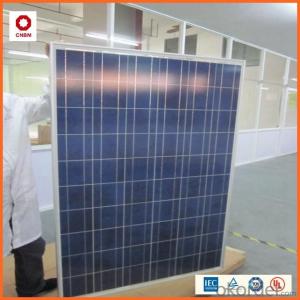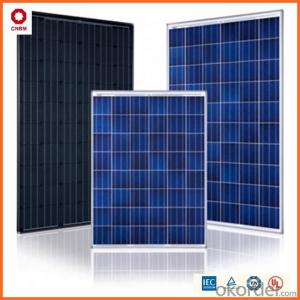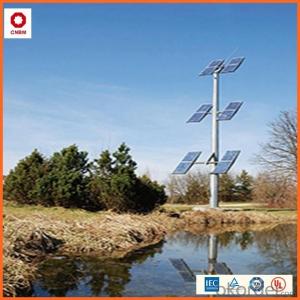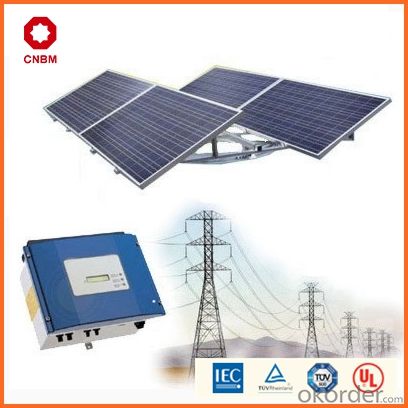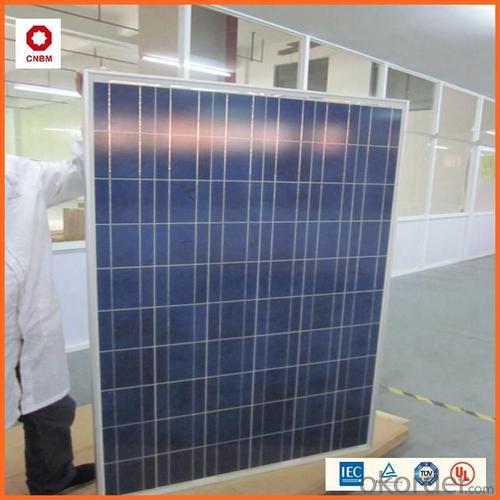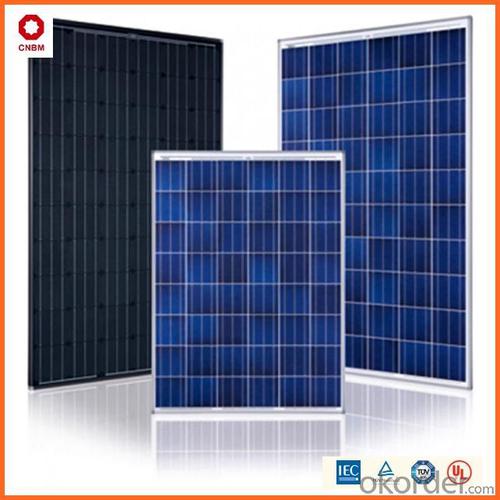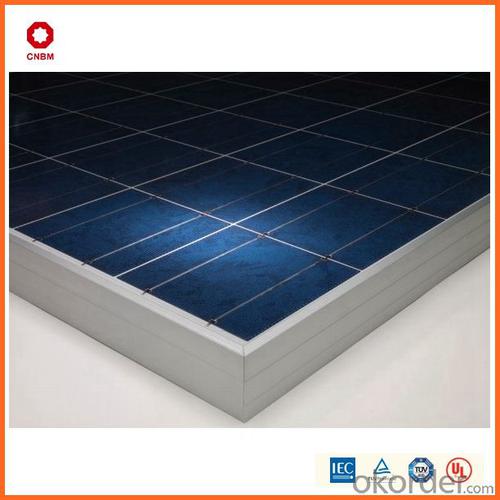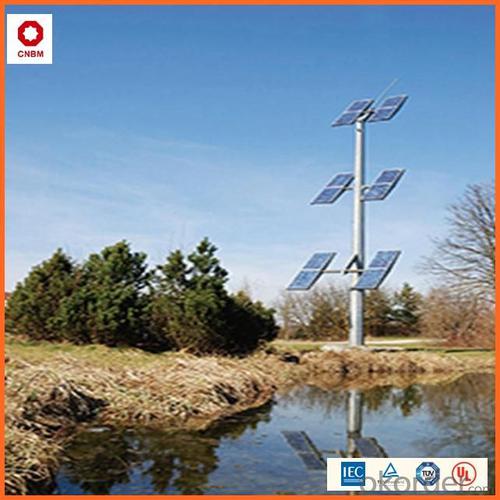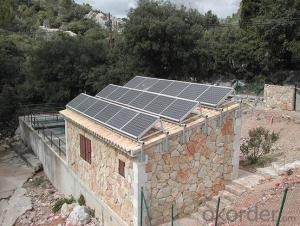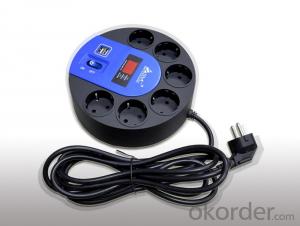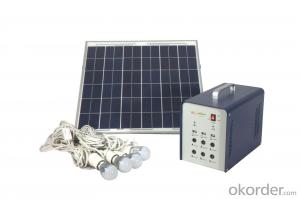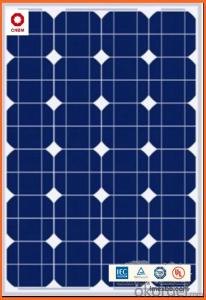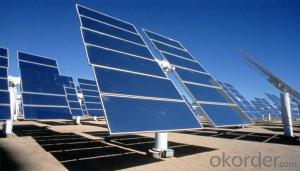Best Value 45w Small Solar Panels with Good Quality
- Loading Port:
- China main port
- Payment Terms:
- TT OR LC
- Min Order Qty:
- 1 watt
- Supply Capability:
- 10000000 watt/month
OKorder Service Pledge
OKorder Financial Service
You Might Also Like
Specification
Hot Sale !!! Quality and Safety of Small Poly Solar Panel 25~85w
1. Rigorous quality control meets the highest international standards.
2. High-transmissivity low-iron tempered glass, strong aluminium frame.
3. Using UV-resistant silicon.
4. IS09001/14001/CE/TUV/UL
Warranties of Small Poly Solar Panel 25~85w
1. 10 years limited product warranty
2. 15 years at 90% of the minimal rated power output
3. 25 years at 80% of the minimal rated power output
Specification
Characteristics of Poly solar panels CNBM (25-85W) | |||||
Max Power Voltage Vmp(V) | 30.3 | 30.8 | 31.1 | 31.4 | 31.85 |
Max Power Current Imp(A) | 7.60 | 7.64 | 7.73 | 7.81 | 7.85 |
Open Circuit Voltage Voc(V) | 36.1 | 36.6 | 37 | 37.3 | 37.68 |
Short Circuit Current Isc(A) | 8.50 | 8.55 | 8.65 | 8.75 | 8.85 |
Max Power Pm(W) | 230W | 235W | 240W | 245W | 250W |
Temperature Coefficient of Cells Poly solar panels CNBM (25-85W) | |
NOCT | 45± 2 |
Temperature Coeffucients of Isc | 0.0492 |
Temperature Coeffucients of Voc | -0.3374 |
Temperature Coeffucients of Voc | -0.4677 |
Mechanical Data of Poly solar panels CNBM (25-85W) | |
Dimension | 1638 × 982 × 40 mm |
Weight | 19.5 kg |
No. of Cells and Connections | 60 (6 ×10) |
Tolerance | 0 ~ + 5 W |
Cell | Monocrystalline Cell 156 × 156 mm |
Packing | 624 Pcs/40ft(H) Container |
Limits of Poly solar panels CNBM (25-85W) | |
Operating Temperature | -40 to +85 |
Storage Temperature | -40 to +85 |
Max System Voltage | 1000VDC(IEC) / 600VDC(UL) |
Features of our products:
• High conversion efficiency mono/poly-crystalline amorphous silicon solar cells
• Modules incorporate high performance bypass diodes to minimize the power drop caused by shading
• High transmittance, low-iron tempered glass
• High performance EVA encapsulant to prevent destroying and water.
• AI frame: without screw, corner connection. 8 holes on the frame can be installed easily
• Good performance of preventing from atrocious weather such as wind and hails
• Certifications: CE IEC TUV VDE UL, Class I
• 10 years 90% power output warranty

Shipping of Small Poly Solar Panel 25~85w
By Sea | Delivery from Shanghai or Ningbo seaport |
By Air | Departure from Shanghai Pudong Airport |
By Express | Post by DHL, EMS, UPS, TNT. |
- Q: Can solar energy systems be used for powering space exploration missions?
- Yes, solar energy systems can be used for powering space exploration missions. Solar panels are commonly used in space missions to generate electricity by converting sunlight into usable energy. These panels are lightweight, reliable, and can provide a continuous power source in space, making them ideal for long-duration missions. Additionally, solar energy is abundant in space and can be harnessed even in the most remote locations, reducing the need for heavy and limited fuel supplies.
- Q: What happens to a solar energy system during a power outage?
- During a power outage, a solar energy system will typically stop generating electricity if it is grid-tied. This is because grid-tied solar systems are designed to automatically shut down when the grid goes down to ensure the safety of the workers repairing the power lines. This means that even though the sun may be shining and the panels are capable of generating electricity, the system will not function until the grid power is restored. However, there are certain types of solar energy systems, such as off-grid or hybrid systems, that can continue to generate electricity during a power outage. Off-grid systems are designed to store excess solar energy in batteries, which can be used to power the home or facility during periods of no sunlight or power outages. These systems are not connected to the grid and function independently, providing a reliable power source even when the grid is down. Hybrid systems, on the other hand, are connected to the grid but also have battery storage capabilities. In the event of a power outage, these systems can switch to battery power, allowing them to continue generating electricity and provide backup power to essential loads in the building. This offers a level of energy independence and resilience during emergencies or prolonged power outages. It is important to note that the ability of a solar energy system to function during a power outage depends on the type of system installed and its configuration. Consulting with a professional solar installer or system provider can help determine the best system for specific needs and requirements.
- Q: How is solar energy stored for later use?
- Various methods exist for storing solar energy for later use. One widely employed approach involves the utilization of solar batteries or energy storage systems. These batteries become charged during daylight hours, when excess solar energy is being generated. Subsequently, the stored energy can be utilized during periods of limited or no sunlight, such as nighttime or cloudy days. An alternative means of storing solar energy is through the adoption of thermal energy storage systems. These systems convert solar energy into thermal energy, which is then stored in a medium like water or molten salt. This stored thermal energy can subsequently be utilized to produce electricity or heat whenever necessary. Moreover, solar energy can be indirectly stored through the utilization of pumped hydroelectric storage. Excess solar energy is employed to pump water from a lower reservoir to a higher one. When electricity is required, the stored water is released and flows down to a lower reservoir, generating electricity via turbines. In addition, solar energy can also be stored in the form of compressed air. Excess solar energy is utilized to compress air into storage containers. When electricity is needed, the compressed air is released and expanded through turbines, generating electricity. In conclusion, the storage of solar energy for future use plays a critical role in ensuring a consistent and uninterrupted power supply. These storage methods enable us to maximize the advantages of solar energy and overcome the challenges posed by its intermittent availability.
- Q: Can solar energy systems be used in areas with limited sunlight?
- Yes, solar energy systems can still be used in areas with limited sunlight. While solar energy systems are most effective in regions with abundant sunlight, advancements in technology have made it possible to harness solar energy even in areas with less sunlight. Additionally, solar panels can still generate electricity on cloudy days or during periods of reduced sunlight. However, the efficiency and output of solar energy systems may be lower in areas with limited sunlight compared to sunnier regions.
- Q: How do solar energy systems affect the installation of satellite dishes?
- Solar energy systems can potentially affect the installation of satellite dishes by obstructing or shading the line of sight between the dish and the satellite. This can result in reduced signal strength or complete loss of signal reception. Proper alignment and placement of both the solar panels and the satellite dish are crucial to ensure minimal interference and optimal performance of both systems.
- Q: Can solar energy systems be used in areas with high levels of bird activity?
- Yes, solar energy systems can be used in areas with high levels of bird activity. However, it is important to take certain precautions to ensure the safety of the birds and the optimal functioning of the solar panels. One common concern is the potential for bird collisions with the panels. To mitigate this, manufacturers often incorporate bird deterrents such as mesh screens or reflective coatings on the panels to make them more visible to birds and reduce the risk of collisions. Additionally, proper installation and maintenance of the solar energy systems can help minimize potential nesting or roosting sites for birds, reducing the likelihood of damage to the panels. By addressing these considerations, solar energy systems can be effectively utilized in areas with high bird activity while still protecting the local avian population.
- Q: Can solar energy systems be combined with energy storage technologies like batteries?
- Yes, solar energy systems can be combined with energy storage technologies like batteries. This integration allows excess energy generated by solar panels to be stored in batteries for later use, providing a reliable and continuous power supply even when the sun is not shining.
- Q: Can solar energy systems be used for powering electric boats or ships?
- Yes, solar energy systems can be used to power electric boats or ships. Solar panels can be installed on the surface of the boat or ship to harness sunlight and convert it into electricity. This clean and renewable energy source can be used to charge batteries or directly power electric motors, enabling emission-free and sustainable navigation.
- Q: Can solar energy systems be used in areas with limited access to solar monitoring systems?
- Yes, solar energy systems can still be used in areas with limited access to solar monitoring systems. While solar monitoring systems can provide valuable data and insights for optimizing the performance of solar energy systems, they are not essential for the basic functionality of the systems. Solar panels can still generate electricity from sunlight even without monitoring systems. However, without access to solar monitoring systems, it may be more challenging to track and assess the performance, diagnose issues, and monitor the overall efficiency of the solar energy systems.
- Q: Can solar energy systems be connected to the grid?
- Yes, solar energy systems can be connected to the grid. This is known as grid-tied or grid-connected solar power. When a solar energy system is connected to the grid, it allows for the excess electricity generated by the system to be sent back to the grid, while also drawing power from the grid when the solar panels are not producing enough electricity. This grid connection enables homeowners and businesses to benefit from net metering, where they receive credits for the excess electricity they supply to the grid, resulting in reduced energy costs.
Send your message to us
Best Value 45w Small Solar Panels with Good Quality
- Loading Port:
- China main port
- Payment Terms:
- TT OR LC
- Min Order Qty:
- 1 watt
- Supply Capability:
- 10000000 watt/month
OKorder Service Pledge
OKorder Financial Service
Similar products
Hot products
Hot Searches
Related keywords

